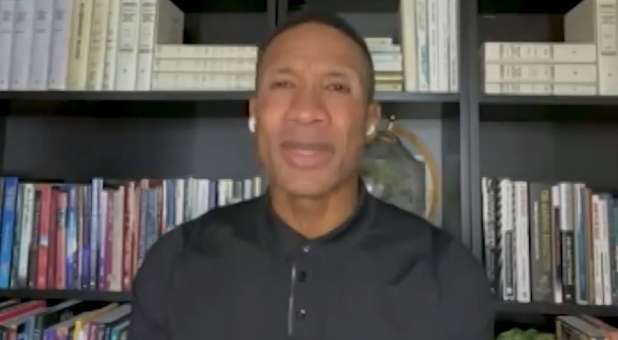Prophetic Evangelist: Racist Cops Murdered My Father Too—Here’s How We Should Respond
Charismatic African American pastors and evangelists spoke at The Rock Family Worship Center in Huntsville, Alabama, this week to discuss how believers can be kingdom-minded during times of racial tension. The speakers included prophetic evangelist Sean Smith, intercessor and author Will Ford and Bishop Kyle Searcy, who serves as the senior pastor of Fresh Anointing House of Worship in Montgomery, Alabama.
Smith began by sharing how his father was murdered by racist cops decades ago—making the topic very personal for him.
“When I was 9 years of age, I came home to find out the night before my dad had been murdered by policemen,” Smith says. “They were white policemen, and it was proven in court in San Jose, California, that it was racial. They profiled, and they went after him. My dad was a chemical engineer for IBM. He didn’t commit a crime, didn’t look like anyone who had committed a crime. … The officers said that my dad tried to go to a trunk to get a tire iron to attack them, thus justifying them murdering him, but they found out that the tire iron did not have my dad’s fingerprints. It only had the officers’ fingerprints. It was a plant. They sicced the dog on him. It was overheard that they called him [a racial slur]. … They killed him and murdered him in cold blood.”
Smith says that God gave him a prophetic word regarding how the church should respond to this season.
“In the midst of a global pandemic, there has come a worldwide pause, and God is calling for us to have a divine pivot,” Smith says. “[For] this thing that happened—first with Ahmaud Arbery … and then more recently the situation happened with George Floyd, … The Lord gave me this phrase: ‘Peacemakers in polarizing times.’ And as a body of Christ, we’re called to be peacemakers in polarizing times. To borrow from a more current, iconic movie, in the movie Black Panther put out by [Marvel], the protagonist of the movie, T’Challa, made a statement. He said, ‘In times of crisis, the foolish build barriers but the wise build bridges.’
“In the body of Christ, I kind of feel like the Lord is calling us right now to demonstrate this love that we say we possess. We say that God’s love is an equal, level playing field. We have an equal opportunity love. … As I’ve come into this middle-aged place, I find that the more I’ve set down roots, the more I can get caught in routines. And God is trying to deal with that, because I think what happens is [that] we’ve allowed, in some instances, a fallen man’s worldview to affect a risen King’s agenda. And it’s being exposed right now. We have to understand that the answer is the Lamb’s agenda now. We can be a voice.”
Smith suggests the church needs to take lessons from Abigail in 1 Samuel 25, who creates peace between two different sides. But that doesn’t mean exalting peace over justice or simply seeking to return to the status quo; it means pursuing the authentic peace of God and trying to bring that into society.
“What she did in that moment, that is a picture of what we as the church should do. … We should be peacemakers. Not peacekeepers—peacekeepers is peace at any cost. ‘We’re going to not talk about the controversial things. We’re not going to have a night like tonight where we’re talking about it.’ That’s what a peacekeeper would do. But we’re called to be peacemakers. So we can come to the table. We can talk. Because we believe that God’s love can supersede whatever it is that the enemy can throw.”
Ford also added that the intensity of this movement likely comes from years of young Christians observing racial injustice but feeling like their complaints have been dismissed by older leaders. Ford singled out some leaders—like Lou Engle, Cindy Jacobs, Harry Jackson and others—as doing good work in this regard, but he says they are a “minority” who feel that way. Other leaders often treat racial reconciliation as an optional project or as a “distraction” to the gospel, and Ford believes that’s wrong. He believes God has put the desire for racial and social justice into the next generation.
“I’ve been about 20, 25 years in the prayer, worship and prophetic movement, and [young people] send me private messages,” Ford says. “They send me things like, ‘Hey Mr. Ford, we talk more about diversity at my job than we do in the church,’ and they’ll show me a flyer for a conference and it’ll be all black or all white—[even with] 18 different speakers and all that on it. And they’re like, ‘Where is the unity through diversity in the church?’ They’ve been pained about this for years. So I think that’s one of the reasons why you see the angst being released now with the young people, especially those in the church. Because they’ve been seeing [leaders treating] … healing the racial divide like it’s a distraction and moved on to other things and left it to other folks and said, ‘Well, you know, that’s not my assignment.’ Really, we’re all called to be reconcilers.”
You can watch the full panel discussion here. {eoa}




























































